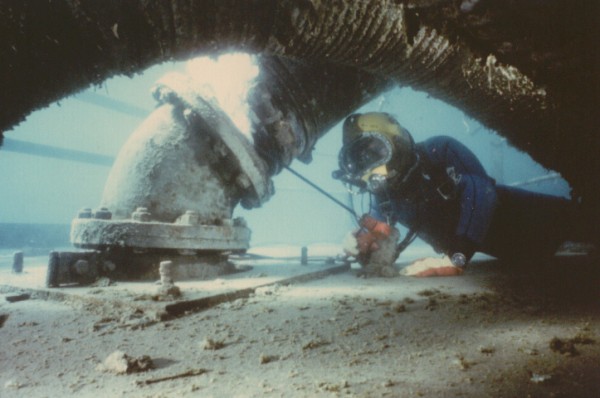Job skills run deep at Dryden Diving

When a nightclub on Pier 34 collapsed into the Delaware River in May 2000, killing three young women, Dryden Diving Co. was called in to inspect the century-old structure.
When a tug-driven barge ran over a duck boat and killed two young tourists in July last year, Dryden Diving was summoned to examine the barge.
This small South Jersey company – with $5 million to $6 million in annual revenue and a dozen to 35 divers working at any one time – is one of about 200 commercial diving contractors in the United States.
Next time you cross a bridge and wonder who put the beams, concrete, and metal piles under water, chances are it was a marine construction company that employs divers, or a commercial diving outfit, like Dryden.
“We’re kind of like firemen. We often don’t know what we are going to be doing today,” said President Don Dryden, 58, who worked 10 years as a wharf and dock builder before starting his own company in 1979.
In more than three decades, Dryden Diving has worked in radioactive and contaminated water; pier restoration; pipe, bridge, and dock inspections and repairs; and responded to emergencies as far away as Michigan, Wisconsin, Chicago and Vermont.
Clients include the Port of Philadelphia and five nuclear power plants that are part of Entergy Corp.
The phone can ring at any hour of the day or night at Dryden headquarters near Swedesboro, N.J., with situations such as these: A ship has run aground and the Coast Guard wants it inspected. A tugboat’s line is caught in a wheel. The water intake screen on a dam or power plant is clogged.
“We go to great lengths to make sure the right diver shows up on the job,” said Dryden, whose wife, Patty, manages the administrative side and finances. “We very carefully match people to the job.”
Three Dryden divers recently finished demolition and removal of debris at an old BP Refinery pier in Paulsboro, N.J. Other divers are repairing pilings on a bridge on Route 30 in Absecon, N.J., near Atlantic City.
A third dive team will be at Indian Point nuclear power plant in New York this week, removing trash and muck from the screens that filter water to cool the plant.
No matter the hour, or how frigid the water, Dryden divers are on call.
Just being a scuba aficionado in the Caribbean is not a qualification for commercial diving. These men (and a few women) are skilled welders, mechanics and carpenters.
“A good career to have would be a welder, mechanic, and any construction experience,” said diver Andrew Yoder, 30, of Coatesville, Pa.
“You have to know how to work on the surface before you can work below it,” said diver Tom Zajac, 33, of Atlantic City, a diver since 2004 who graduated from the Divers Academy of the Eastern Seaboard in Camden, N.J. “It’s easier to teach a welder to dive than a diver to weld,” he said.
When divers make the plunge in 20, 40, or 100 feet of water, the source of air is an umbilical line snaked up to the surface.
“It’s all surface-air supply with a helmet,” said diver Lou Ericsson, 49, of Westville, N.J. “We have an airline, and a communication line, so you are always listening to the diver and talking back and forth.”
“Diving is fun. It’s a challenging job because we are always doing something different, and figuring out the problems,” said Ericsson, who has been diving since 1986.
In 2003, an emergency call came from the Conowingo Hydroelectric Plant on the Susquehanna River in northeastern Maryland. A sudden surge of water caused a flood, and workers could not close a critical door. The plant was evacuated. Dryden divers descended an emergency evacuation stairway to shut the door. Afterward, plant workers pumped out the interior of the dam.
The divers are members of Wharf and Dock Builders and Pile Drivers Local 454 of the United Brotherhood of Carpenters and Joiners of America. The union runs an apprentice school in Philadelphia that teaches carpentry skills, millwright work, and wharf and dock building.
“Everybody says, ‘I’ve been to a dive school. I can work as a diver,'” said Dryden. “I ask, ‘Well, what did you do before you went to dive school?’ If the person says, ‘I sold insurance,’ I say, ‘Well, the next time I have some insurance to sell under water, you’re the first guy I’m going to call. But I wouldn’t count on that skill coming up.'”
At lunchtime, Dryden often sits with young divers interested in getting into the industry. “As we get room in our shop, we’ll bring a guy on. Then we’ll graduate a guy from the shop to occasional work in the field,” he said.
“It’s kind of like an apprenticeship. A lot of guys in the industry have gone through here and worked their way into the business. We make sure we sponsor them to get them into the union.”
Shortlink:
